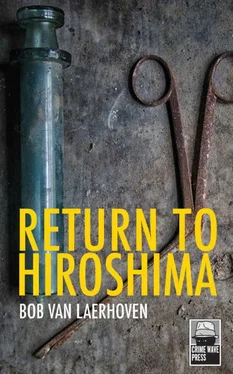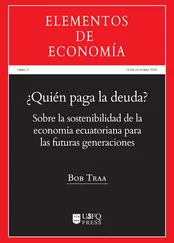What’s he doing? He’s turning away. I look at his back through the white coat he’s wearing. I remember that I used to think my father’s body was made of veined granite.
“Daughter,” he says with his back still turned. “Did I make your life such a misery that you had to give birth like an animal?” His voice sounds like the voices in a dream, plaguing you from the depths of a gurgling well. Give birth like an animal? What does he imply? I want to answer him, but I can’t utter a word. What is there to say when Rokurobei catches up with us?
Hiroshima – Peace Monument – inspector Takeda and his assistant Akira – March 10 th1995
Every corpse inspector Takeda’s job confronted him with made him think of his father, the fornicating buck. But the mutilated body of the baby found by the cleaning crew at the Peace Monument – dedicated to Sadako Sasaki – reminded him of his mother. When Takeda was a teenager, his mother told him about the first baby she delivered in the Dutch East Indies, which she tossed into the camp latrine shortly after its birth in 1943 with the permission of the Japanese guard who had raped her. Takeda, her second son, had been spared the same fate because his mother was still in her eighth month when the women’s camp at Pangkala-Balei in South Sumatra was liberated after the Japanese capitulation. Takeda thinks back to Hubertus Gerressen in a fit of melancholy. That was the name Barbara Gerressen gave him fifty years earlier, the name he no longer bears.
Takeda doesn’t know his father’s name. Barbara Gerressen didn’t know it either, or refused to mention it. All her life she referred to him as “that fornicating buck”.
His mother’s moods and convictions were extremely volatile, all down to the painful experiments the Japanese occupier conducted on her and many other women in the camp. If you could seduce one of the guards, stir his lust, you were better off. Barbara’s Dutch pragmatism almost dictated it. Result: a fertile belly bulging for a second time. Destined for the latrine as before, but the liberation got in the way. After the camp, Barbara Gerressen loved and hated her son with tremendous intensity for the rest of her life. She never knew why. Perhaps she thought too much about her firstborn.
The inspector stares at the bullet-shaped memorial to Sadako Sasaki, the twelve-year-old little girl who was standing on Misasa Bridge when Little Boy exploded above her head and toxic radiation descended on the city like a blanket. She died ten years later from leukaemia. Sadako spent the last year of her life folding paper cranes because a clairvoyant had predicted she would survive if she reached a certain number. Takeda couldn’t remember how many, only that she had folded many more than the required number when she died with malignant bulges on her neck and throat. The hibakusha later picked up her habit. Nowadays, after every school trip, hoards of nervous, giggling schoolgirls leave behind a veritable mountain of finely folded paper at her monument.
The inspector kneels beside the swollen lump of flesh. Colourful paper cranes are piled up next to the tiny corpse. Under his breath Takeda curses the person who discovered the body and phoned the gutter tabloid Shukan Gendai before warning the police. It must have been one of the cleaners, but everyone’s denying it. Takeda is convinced they all received an equal share of the tip-off money. He has Shukan Gendai ’s local photographer traced, accusing him of disturbing a murder investigation and removing forensic evidence from a crime scene. The man defends himself by insisting that he’d come to photograph the monument for an “opinion piece” prior to the commemoration of Little Boy ’s fiftieth anniversary and “stumbled over the corpse” in the process. As a good citizen he had taken photos first and then informed the cleaning crew. His photos will appear on the front page under a glaring headline.
“Inspector?” Wary-eyed and bespectacled detective Akira appears behind Takeda’s back, striking a quasi-military pose.
“Yes?”
“The forensic people are here. They want permission to start work.”
In his youth, inspector Takeda’s hair wavered between blond and red, just like his mother’s. Now it was turning grey. His angular features had a rugged hue that still glistened like copper in the sun. Takeda has always considered the enforced racial fusion that led to his birth unseemly. Large, plump, cumbersome hands and feet, robust shoulders. The inspector moves like the trained judoka he is and has been for years.
“Wait for a bit, Akira.” The inspector stoops closer to the tiny corpse. The subdued light under the monument casts a uniform glow over the baby’s blackened skin. The body looks like a doll that’s been baked at too high a temperature. Its head is swollen and misshapen. Hardened fibrous tissue protrudes from its eye sockets. A lump of raw flesh – the tonsils? – bulges from its lipless mouth. The naked little body has the colour and texture of black porcelain. But the crotch is distended, a snow-white protuberance, the genitals melted like congealed egg-white. The inspector pulls on a thin latex glove. He doesn’t touch the corpse. His hand makes a gentle waving motion above the head, then the heart region, then the crotch.
Akira turns away. As a modern Japanese man he abhors such displays. But time after time superstition takes over and sends a slight shiver down his spine.
Takeda’s face remains motionless, writing off some of his colleagues’ claim that he has a sixth sense to sheer accident and his share of luck. But a feeling overcomes him nevertheless that’s best described as the moment before a tornado lets loose. A tingle of electricity runs across his chest from left to right. He picks up an intensity of pain and anxiety he’s never experienced before.
Hiroshima – Dr Kanehari’s private clinic – Mitsuko and Dr Kanehari – March 10 th1995
“Pseudocyesis,” says Dr Kanehari. My father’s face, always so inscrutable and stern, with those inward looking eyes almost impossible to engage, refuses to leave the room. It floats past in a slow blur, but I can still feel his presence, so powerful that I begin to doubt he was a dream. My legs are cold, my head trapped in an airless bubble. At the same time my limbs feel tense, ready to escape. I can see tiny droplets of sweat on Dr Kanehari’s forehead, crystal clear, as if through binoculars.
“What do you mean?”
The doctor looks at me as if he doesn’t understand why I should be asking him a question. “Phantom pregnancy. It’s rare, but the women who suffer from it are usually so desperate to get pregnant they experience all the symptoms: nausea, occasional vomiting, increased weight, sensitive, painful breasts, excessive sleep.”
“But…”
“You called me,” the doctor interrupts. “You didn’t want the foetus removed. You wanted to have the baby and give it to your sister. It was only after I agreed to your request that I realised you weren’t pregnant.”
“But I felt it kick! I talked to…”
Kanehari shakes his head. He tries to placate me. I sense he’s hiding something.
“Phantom pregnancies are often related to hysteria, even temporary insanity, a psychosis resulting from an enormous and merciless longing.” The doctor appears to be content with his last observation.
“Why did you put me under?”
“Standard procedure.” Kanehari joins his hands, palm to palm. “You should understand that given the circumstances I’m obliged to charge my full fee, as we agreed. I presume you’re fit enough to leave. Now you know what’s happening, your body will quickly adapt. You can already see that the swelling has largely disappeared.”
Читать дальше












